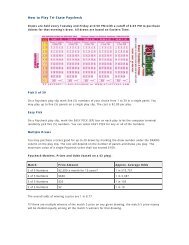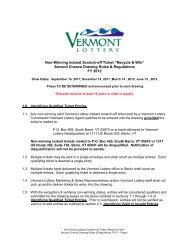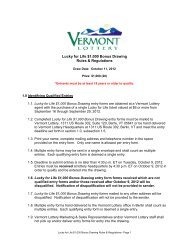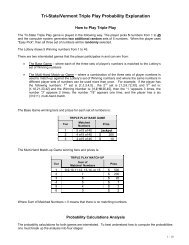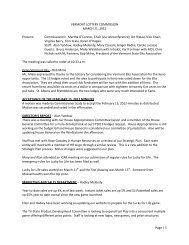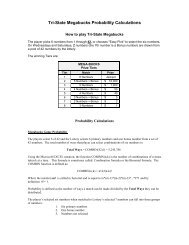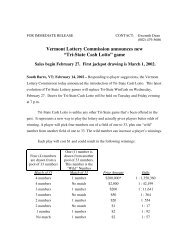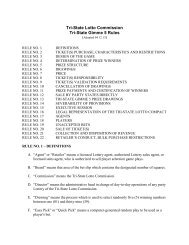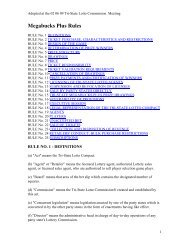AnnuAl rEPort - Vermont Lottery
AnnuAl rEPort - Vermont Lottery
AnnuAl rEPort - Vermont Lottery
You also want an ePaper? Increase the reach of your titles
YUMPU automatically turns print PDFs into web optimized ePapers that Google loves.
VERMONT LOTTERY COMMISSIONANNUAL REPORTFISCAL YEAR 2008NOTES TO FINANCIAL STATEMENTSJune 30, 2008 and 20071. Summary of significant accounting policies (continued):C. Revenue recognition - Sales of instant lottery tickets are made to licensed retailers who market the tickets to thepublic on a commission basis. Revenue is recognized when the books of tickets are settled with the retailers. Ticketsactivated, but not sold by retailers, may be returned for credit. Sales of online lottery tickets are made to licensedretailers who market the tickets through the use of computerized terminals on a commission basis. Ticket revenueis recognized weekly. Tickets sold in advance of future drawing dates are recorded as deferred revenue until the ticketbecomes valid for a drawing.D. Expenses - Commissions and fees for the instant and online games are recognized weekly. Administrative expenses,such as salaries, benefits, contracted services, depreciation, equipment and supplies are included in the <strong>Lottery</strong>’sannual operating budget appropriation from the Legislature. This budget appropriation came from <strong>Lottery</strong> revenues.Other <strong>Lottery</strong> operating expenses, which will vary with product sales volume, such as lottery tickets, courier system,agent network expenses and facilities management fees for the gaming systems vendor are considered “cost ofgoods”, are part of an authorized amount approved by Finance and Management, and are derived from <strong>Lottery</strong>revenues. In addition, <strong>Vermont</strong> State Statute Title 31, Chapter 14, §658 provides that agent commissions may notexceed 6.25% of gross receipts and bank commissions may not exceed 1% of gross receipts. The statutes alsoprovide that the <strong>Lottery</strong> must pay out no less than 50% of gross receipts as prizes.E. Cash and cash equivalents - Cash includes demand deposits and short-term investments with a maturity datewithin three (3) months of the date acquired by the <strong>Lottery</strong> except for amounts included in the investment account.F. Investments - Investments with readily determinable fair market values are reported at their fair market valueson the balance sheet. The <strong>Lottery</strong>’s policy is to retain in net assets the unrealized gains and losses on long-terminvestments held for the purpose of paying long-term installment prizes due to winners. This policy is consistentwith the provision for apportionment of <strong>Lottery</strong> revenues in Title 31, Chapter 14, §654 (11)(A).G. Property and equipment - Property and equipment are stated at cost, recorded as a capital asset based on the natureof the item and depreciated over the estimated useful life of the asset. Capital assets are defined by the <strong>Lottery</strong> as assetswith an initial individual cost of more than $5,000 and a useful life of more than two years. Capitalized costs include freightin,licenses, title application and any other costs required to establish the initial operation of the asset. Improvements andadditions to an asset are capitalized. Maintenance and repair costs are not capitalized. Depreciation expense is calculatedusing the straight-line method over the estimated lives of the assets which are:Office furniture and equipmentLeasehold improvements3-7 years10-15 yearsH. Compensated absences - <strong>Lottery</strong> employees are entitled to certain compensated absences based on their lengthof employment. Generally, compensated absences either vest or accumulate and are accrued when they are earned.Sick leave does not accrue beyond annual use.I. Advertising - Advertising costs are expensed as incurred.19



